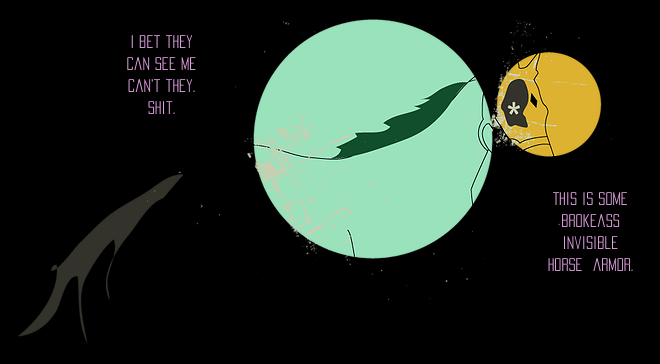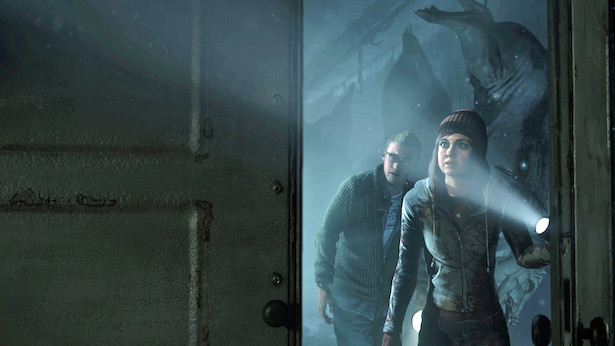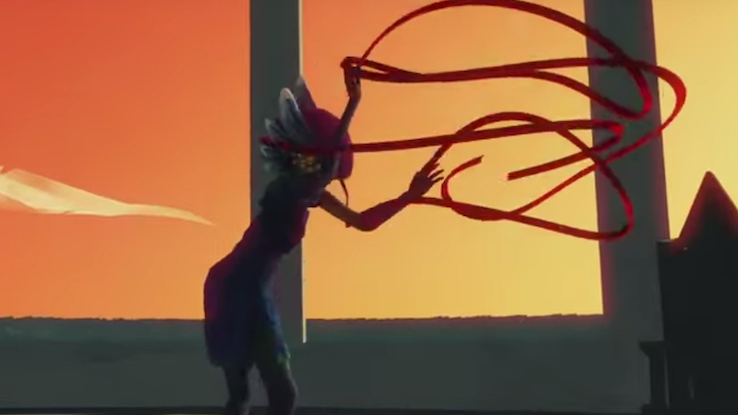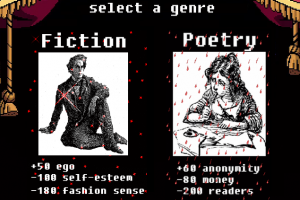 The line between adventure games and interactive fiction is at best a little blurry, and sometimes doesn’t exist at all, and finding that line in author Matthew Burnside’s forays into interactive media and games is a particular challenge. Often, in adventure games that skew toward interactive fiction, the plot’s the thing; the game is driven by story, with occasional forays into action sequences or puzzle-type challenges, or as might be said, gaming moments are inserted to break up sections of story. Burnside’s framework definitely lies in the realm of multimodal fiction, as he employs fewer game elements, but one of the fascinating things about his work is the use of the language of games to tell stories, with references to powers, levels, and equipment cropping up in narratives that are decidedly literary in nature.
The line between adventure games and interactive fiction is at best a little blurry, and sometimes doesn’t exist at all, and finding that line in author Matthew Burnside’s forays into interactive media and games is a particular challenge. Often, in adventure games that skew toward interactive fiction, the plot’s the thing; the game is driven by story, with occasional forays into action sequences or puzzle-type challenges, or as might be said, gaming moments are inserted to break up sections of story. Burnside’s framework definitely lies in the realm of multimodal fiction, as he employs fewer game elements, but one of the fascinating things about his work is the use of the language of games to tell stories, with references to powers, levels, and equipment cropping up in narratives that are decidedly literary in nature.
I’ve known Matthew Burnside for a long time, since before he won a coveted fellowship at the Iowa Writers’ Workshop; we met while applying for MFAs, and connected over our shared love of weird pictures, weirder stories, and of course, games. We’re also both members of a small (but secret! shh!) online writers’ group, and a few years ago, he whipped up a little role-playing adventure for us, promising to run folks through one at a time. I never got to take my turn—I’m still bitter—but several months later, when he began talking about writing a novel in wiki format, I figured it was just a matter of time before he started making games. Maybe he was all along; I’ve never asked. All I know is his recent efforts are small, stunning glimpses into the mind of a restless writer with a lot to say.
Burnside’s currently available efforts take different approaches and rope in different themes, but there are common elements: his fascination with seizure-inducing, sparkling gifs, kittens, and wry humor are sprinkled throughout. Clicking through Writer: The Game, for instance, or loading the main screen of Are You There, Internet? It’s Me, Bolivia just feels like a typical conversation with Burnside, which might already be riddled with bears and Steve Buscemi. It’s hard to imagine these projects through the eyes of a stranger. What weird artifacts they must be, but the vibrating pictures and wild fonts are a thin veneer over truths sometimes so stark and hard that we might cry if they weren’t dressed up with glitter.
One of his works, however, is a little different; Adjunct is presented in stark fashion, black text on a white background with clickable choices. Nothing fancy here. I spoke with Burnside specifically about Adjunct, a story about, well, adjuncting and how writers get to that tenuous gray area off the tenure track. Adjunct is styled as a “choose-your-own-adventure” game, but the real punch of the work is that there’s no choice. Face it, young writer: you’re probably going to end up an adjunct, working for laughable pay and dreaming of someday landing a real job. It beats working at a coffee shop, right? Except for the hours, and the pay, and the added tension of a contract that might not be renewed at any given time. When I asked him about the project, and how he came to it, Burnside said:
Adjunct is the product of pure frustration, specifically with academia, the job market, and the limited opportunities available to educators these days that would rather not starve for the opportunity to teach. As with most of my interactive work, it’s meant to be playful and irreverent but I’d also consider it an act of satiric protest.
Ishmael Gilgamesh is a pseudonym I initially intended to use to remain anonymous, as I imagined when I first published it that having written it might problematize my simultaneous search for a job in academia. Then, I realized I didn’t care. Anyone who has ever taught college or sought gainful employment in college knows how marginalized adjuncts are, and deep down either they know how wrong and broken the system is or, having miraculously ascended to the comfy confines of an ivory tower, they don’t care.
My only hope is that people enjoy it and feel a little bit of that hopelessness we feel as young educators facing the future knowing the odds are staggeringly against us.
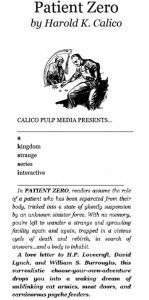 “Playful and irreverent” are good words to describe Burnside’s work, but they’re also too shallow to reveal the whole story of a tireless writer with a sometimes Herculean output, especially now that he’s working more and more in multimodal presentation, something that can take more time than even the most carefully edited short story. He spoke about that process, too, when telling me about his new work—and new pseudonym—Patient Zero by Harold K. Calico.
“Playful and irreverent” are good words to describe Burnside’s work, but they’re also too shallow to reveal the whole story of a tireless writer with a sometimes Herculean output, especially now that he’s working more and more in multimodal presentation, something that can take more time than even the most carefully edited short story. He spoke about that process, too, when telling me about his new work—and new pseudonym—Patient Zero by Harold K. Calico.
The content is already written, filling up a few heavy binders in my bedroom, but the process to transfer it to Inklewriter is a somewhat slow and tedious process. I’m working on it in my free time (when not teaching, fulfilling other duties, and applying to jobs) and it’s more or less that thing I wish I could focus on exclusively but I’m just not afforded that privilege. Not unless I’d like to starve.
This one will be free of charge, as it’s mostly just for practice, but I’m hoping if people like this sort of thing that they’ll consider buying the next one in the series: A Midnight Snack of Blood, which will be a pulp noir survival adventure set in Midnight City, a violent metropolis where night never ends, graffiti monsters lurk in blood-stained bricks, and trigger-happy Tommy gun wielding gangsters prowl the concrete playground for fresh meat. It’ll probably be priced at around $2 and available on Kindle, which is enough to buy 8 gumballs…or a few hours of entertainment.
While we’ll have to wait for Patient Zero and the follow-up, Burnside has a number of works currently available (and his website lists forthcoming projects, as well as other publications):
- In Search Of: A Sandbox Novel of Exploration (the aforementioned wiki novel)
- Writer: The Game
- Are You There, Internet? It’s Me, Bolivia (a digital chapbook experience for charity)
- Adjunct

